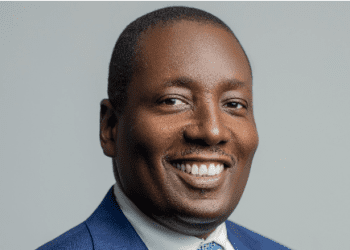The Governor of the Bank of Ghana, Dr Johnson Asiama, has reaffirmed the central bank’s commitment to safeguarding and building strong financial buffers for Ghana’s economic stability amidst rising global uncertainty, while also calling for a unified industry approach to drive the country’s digital finance revolution.
Speaking at the Ghana Association of Banks Industry Thought Leadership Forum in Accra, Dr Asiama emphasized that the Bank of Ghana remains vigilant in monitoring global developments—especially the unfolding Iran–Israel conflict—and stands prepared to act swiftly to protect Ghana’s financial and economic gains.
“Our foreign reserve position, inflation trajectory, and fiscal consolidation provide a solid cushion,” Dr Asiama stated. “We are ready to adopt prudent and pre-emptive measures to shield our economy from external shocks.”
Digital finance disruption and the banks’ crossroads
Dr Asiama described Ghana’s digital finance sector as undergoing a “rapid and profound transformation.”
According to the Bank’s March 2025 Summary of Economic and Financial Data, over 97% of all digital transaction volumes and 72% of transaction value now occur through mobile money platforms, with bank digital channels contributing less than 1% of volume.
This evolution, he said, marks a structural shift, not a temporary trend.
“Fintechs and telcos are redefining financial access and consumer behavior. Banks must now reimagine their role in this fragmented, mobile-first ecosystem,” he urged.
With more than 4 million Ghanaians accessing unsecured mobile loans—services historically beyond the reach of traditional banks—Dr Asiama called for a strategic reset.
“Banking the last mile is no longer a moral imperative alone. It is now a strategic necessity.”
From access to value: The next frontier
While Ghana has built solid digital infrastructure with over 24.2 million active mobile money accounts and growing fintech penetration, the Governor noted that actual usage of digital accounts for savings, insurance, and credit remains low among women, rural residents, and low-income populations.
“The challenge isn’t just infrastructure,” he said. “It’s relevance. We must design inclusive financial products that address real needs. That’s where industry-led strategies become indispensable.”
Cedi stability reflects strong fundamentals
Touching on the cedi’s recent stability, Dr Asiama was clear: “The cedi’s performance is not artificial. It is the result of disciplined monetary policy, improved FX market transparency, and better external fundamentals.”
The Bank has reduced its dependency on reserves and now employs a robust FX auction framework.
These changes, combined with IMF-supported fiscal reforms, disinflation, and rising investor confidence, have helped anchor exchange rate expectations.
“The BoG remains committed to a flexible exchange rate regime supported by sound policy—not arbitrary targets,” Dr Asiama stressed.
New blueprint for inclusive digital finance
The Governor outlined three strategic priorities that will anchor Ghana’s transition into a digitally inclusive financial ecosystem:
Open banking and infrastructure standardization
Dr Asiama announced the formation of a Technical Working Group on Open Banking Readiness to promote API standardization, consumer data portability, and competitive product layering. “Banks must lead in this space—not follow,” he said.
Interoperable digital identity for inclusion
The BoG is collaborating with public and private partners to integrate biometric authentication across payment platforms.
This initiative aims to streamline onboarding, mitigate fraud, and provide seamless access to credit and insurance, especially in underserved areas.
Collaborative models for reaching the last mile
The Governor urged banks, telcos, and fintechs to jointly deliver services through blended delivery models—such as agent banking, co-designed micro-loans, and cooperative-based micro-insurance schemes.
The BoG will facilitate this innovation via its Regulatory Sandbox, soon to be upgraded for more agile supervision.
Policy commitments for a resilient ecosystem
To solidify the foundation for Ghana’s digital financial future, Dr Asiama announced three key regulatory initiatives:
National Digital Finance Interoperability Forum to begin quarterly meetings by Q4 2025.
Digital Identity Integration Mandate requiring all financial institutions to adopt unified identity standards.
AI and Risk Governance Working Group to craft policy on AI’s use in credit scoring and fraud detection.
“These actions form part of our vision for a safe, interoperable, and inclusive financial ecosystem—co-created by the industry,” Dr Asiama said.
A call for courage and coordination
He concluded with a call for industry unity and accountability. “This is not just about innovation—it’s about coordination and commitment. Let us leave this forum with a unified agenda: rebuild trust, embed value, and make Ghana a beacon for digital finance across Africa.”














